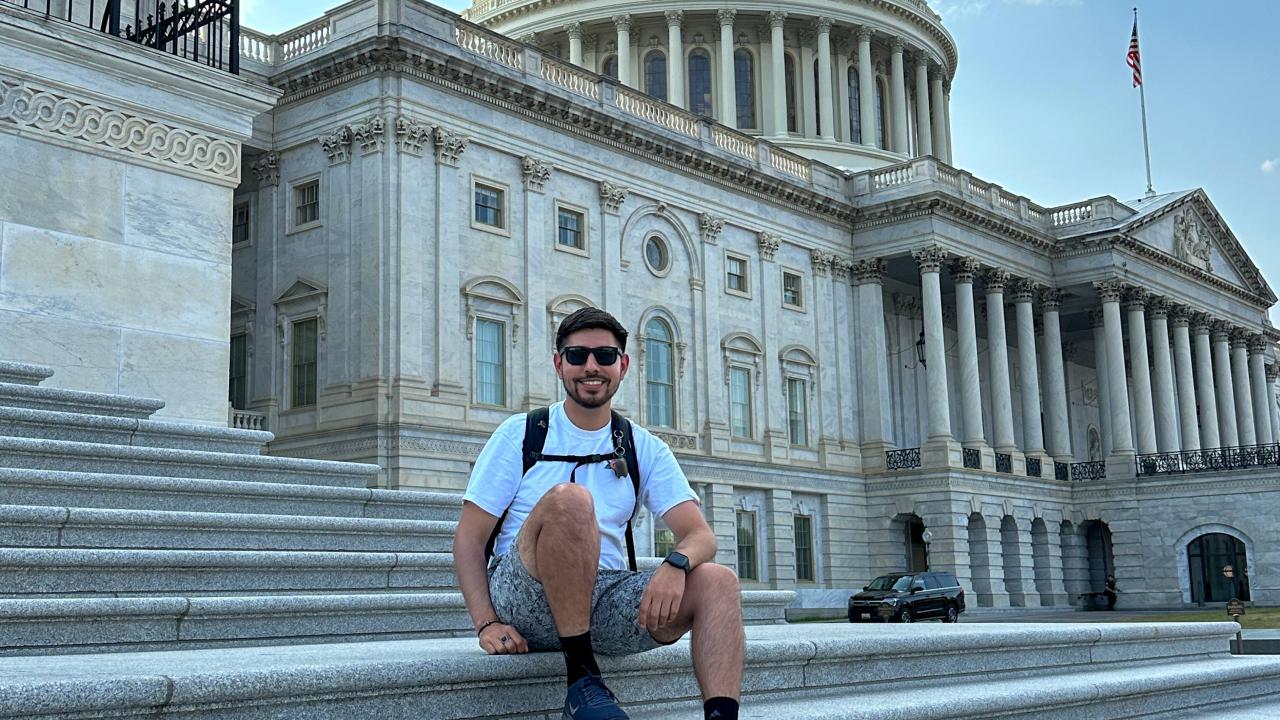
Student Spotlight- Alejandro Sanchez
Greetings, Esteemed Members of the EPM Community! My name is Alejandro Sanchez, though most know me as Alex. Funny story, growing up whenever I introduce myself as Alejandro, people would inevitably start singing the Lady Gaga song ‘Alejandro’, which, don’t get me wrong, is a great song. But after hearing about it so much, maybe that’s why I chose a nickname. Either way, both names work just fine! :D
My parents immigrated from Jalisco, Mexico, to Los Angeles where I was born. Shortly after, my parents decided to keep moving north to Lake County. You might be wondering, where is this rural county I’ve never heard about? It’s the neighboring county Northwest of Napa County, known for its natural beauty characterized by numerous lakes, rolling hills, and expansive vineyards. Clear Lake, the largest natural freshwater lake entirely within the state, is a popular place for outdoor activities like camping and boating.
My academic career started at Santa Rosa Junior College, where I earned a Natural Sciences associate degree, and then continued at Sacramento State University, where I obtained a bachelor’s degree in environmental science. I’ve had numerous jobs, ranging from a vineyard operator as a pesticide applicator to an air quality technician with a Sacramento-based NGO names United Latinos, where we conduct air quality research in disadvantaged and environmental justice communities around Sacramento. Collectively, I’ve worked in in the air quality field and community engagement for almost two years now. This past summer, I had the privilege to intern for the U.S Naval Research Laboratory (NRL) in Washington, D.C., where I conducted proteomic profiling (study of proteins) for different organisms like fungi, barnacles, and marine bacteria. I am currently working with Dr. Clare E. B. Cannon as a GSR for her project called, “Toxic Air Pollutants in CA Environmental Justice Zones.” Read More About It Here! My ambition is to continue addressing environmental public health issues in Sacramento County, focusing on hazardous air pollutants, water contamination, and exposures to hazardous substances.
Why did you choose the EPM program to pursue your graduate education?
Back in March of 2023, I faced the decision of choosing between Berkeley, USC, and Davis. So, why did I choose EPM? Two words: Academic self-reliance. I felt like other programs were highly specialized, which can be a good thing. But EPM stood out with its interdisciplinary curriculum. This approach covers a range of topics like environmental law, economics, environmental science, and policy analysis. If you wanted to explore even further, EPM provides opportunities to dive into areas such as sociology, political science, transportation studies, toxicology, and, community and regional development. The program is designed to facilitate a broadened perspective and a well-rounded understanding of environmental issues. However, what did it for me were the cute cows because who doesn’t love cows?
In what ways are you involved on campus or in the program?
I am currently serving as the EPM Social Committee as the Treasurer where I help keep track of committee spending and revenue. Additionally, I hold the position of the first-year representative on the EPM Executive Committee.
Why do you think it is important to get involved outside of the classroom?
This is very important, to find a sense of community on campus can make or break a program. Establishing connections with fellow students, faculty members, and professionals can significantly enhance the overall experience. Visiting different centers on campus and hanging out with other people from the program has been a source of motivation this quarter!
What do you hope to get out of this program?
Having graduated with a degree in environmental science degree, I feel like I had a solid foundation for scientific concepts but needed more skills in analyzing environmental policies, understanding their implications, and developing strategies for effective environmental management. My career goals focus on connecting science, community engagement, and policy. That is why I want to work in state government for a regulatory agency like the CA Air Resources Board (CARB) to help facilitate efforts with local communities to enact change. This requires networking opportunities, which the program offers an extensive network of professionals, alumni, and organizations.
What is a fun fact about you?
By now, everyone in the first-year cohort probably knows, but for those who might not, my favorite animal is a goat. My parents have two pet goats: An Anglo Nubian named Mirabel and a Boer named Shiva. They’re such social and playful creatures with their ~320+ degree vision (depending on the breed). I want to have enough land one day to have a whole bunch of them running around!! I also just love going to different places, whether it’s a hill, mountain, or puddle somewhere in the middle of nowhere or a quirky coffee shop down the street. I’m genuinely excited to be part of the EPM Community and eagerly looking forward to the next year and a half!
